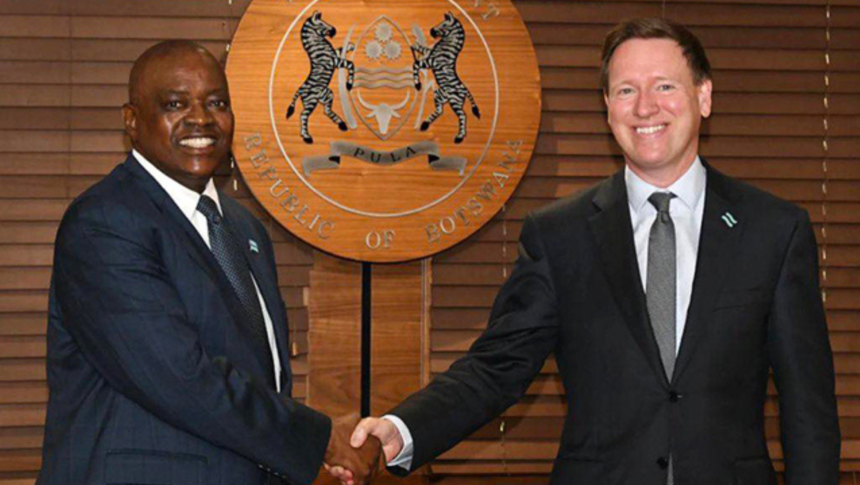In a bold statement made in 2013, Botswana’s President Mokgweetsi Masisi warned that his country might sever its longstanding partnership with the diamond behemoth De Beers. The warning came amid negotiations to renew a crucial sales agreement, which significantly impact Botswana, Africa’s top diamond producer.
President Masisi called on the citizens of Botswana to support his government’s efforts to secure a more favourable deal from De Beers. The existing sales agreement, established in 2011 between the government and De Beers through their 50-50 joint venture, Debswana, was due to expire in 2021. “If we don’t achieve a win-win situation, each party will have to pack its bags and go,” he declared, highlighting the high stakes involved. Masisi said “We are upping the stakes because we want a larger share from our diamonds. It can’t be business as usual,” he warned, signalling a potential major shift in Botswana’s diamond trade dynamics.
True to his word, many years later, Masisi managed to negotiate a favourable deal with De Beers. Under the new deal De Beers and Botswana have agreed to increased Botswana ‘s allocation of Debswana run off mine from the current 25 % to 30 % when the new deal takes off, with gradual increase to 50 % over the 10 years of the new sales agreement. This is crucial for Botswana and Africa in its entirety, this move is what many countries should follow when negotiating terms for mining in their respective countries. A deal that benefits the country and its people than the investor alone, Botswana is on its way to controlling its own destiny through proceeds from its mineral resource.
Furthermore, as part of the new deal, De Beers will invest P1 billion annually for 10 years towards the newly established Diamond for Development Fund aimed at helping Botswana diversity its economy from diamond over dependency.
Due to confidence in the partnership agreement, De Beers Group announced that it will be moving its Auctions business headquarters from Singapore to Gaborone, Botswana. This strategic move is aimed at consolidating operations and enhancing the efficiency of its activities, as well as supporting the ongoing development of Botswana diamond sector. This means with such operations, they will bring employment to the country and other expertise that will boost the economy of the country and livelihoods of the people of Botswana.
Al Cook, Chief Executive Officer of De Beers Group, expressed enthusiasm about the move, stating, “Consolidating our global diamond trading business in Botswana is a significant step forward. Our experience with the Global Sightholder Sales in Gaborone over the past 11 years has proven highly successful, and moving our Auctions business here aligns with our goals for operational efficiency and enhanced customer service. I am confident this move will also play a crucial role in the further development of Botswana’s vibrant diamond sector.”
This relocation shows De Beers’ ongoing commitment to Botswana, a country that has increasingly become a central player in the global diamond industry. The move mirrors a similar relocation in 2013 when De Beers Global Sightholder Sales shifted from the United Kingdom to Botswana. Having successfully operated in Gaborone for over a decade, this decision reflects a well-established confidence in the local market’s capability and growth potential.
This strategic shift not only reinforces Botswana’s position in the diamond industry but also promises to bring new opportunities and economic benefits to the country. Botswana Government and De Beers Group have set the 28th June 2024 as the official deadline for signing of the long form agreement. The two parties signed statement of principles on the 30 June 2023 after lengthy negotiations that birthed a new dawn for the over 50-year partnership.
Later on the 30th September 2023 the two parties signed the heads of terms, further committing to a long term partnership that will last for the next decades. His Excellency Dr Mokgweetsi Masisi hosted De Beers Group CEO Al Cook and De Beers Botswana Resident Director Neo Moroka.
President Masisi said he was pleased the two parties had found common ground in working on a new mutually beneficial agreement after Botswana expressed displeasure with some past clauses he described as archaic.










